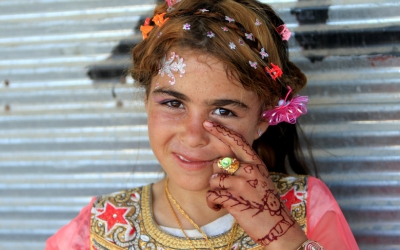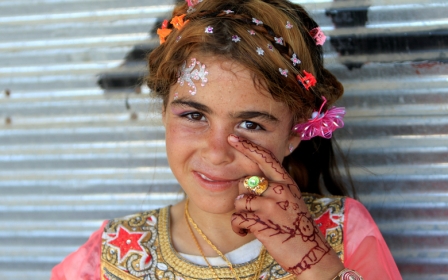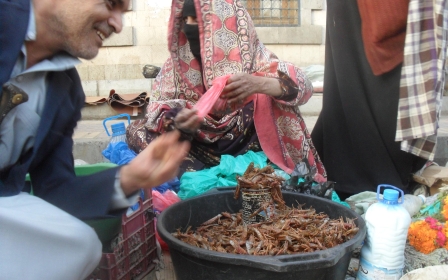Crescent conflict: Warring sides divide Yemenis over Eid

It’s not unusual for Eid, the Muslim holiday celebrating the end of Ramadan, to fall on different days in different countries.
But in Yemen, a dispute between rival governments over the sighting of the new moon means that for the first time in the country’s history, Yemenis – even members of the same family, under the same roof - are celebrating on different days this year.
The squabble started on Monday when authorities with the pro-Hadi government saw the crescent and said Eid would be on Tuesday. But pro-Houthi government officials declared that they had not seen it, and called Eid for Wednesday.
Eid is supposed to be an occasion of happiness, encouraging tolerance and forgiveness, and bringing people together.
As both governments urged their followers to observe their Eid, Yemenis say the disagreement created confusion and unnecessary strife after four years of war.
New MEE newsletter: Jerusalem Dispatch
Sign up to get the latest insights and analysis on Israel-Palestine, alongside Turkey Unpacked and other MEE newsletters
‘Children and visitors annoyed me’
Munther Hael, 45, a resident in Taiz city, was the only member of his family to continue fasting on Tuesday. While his relatives ate and entertained guests, Hael slept.
'I am not a Houthi, but I am a Yemeni and I should go after the decision that comes from the capital Sanaa'
- Munter Hael, Taiz city resident
“Children and visitors annoyed me and I did not enjoy Eid day, but that is better than eating a day from Ramadan,” he said.
Sure, Hael said, he could have celebrated with his family, but he made the decision on principle.
“The pro-Hadi government is based in Saudi Arabia and it is clear they declared Eid after Saudi Arabia, while the pro-Houthi government is based in Sanaa and they did not see the crescent in Hodeidah,” Hael said.
“I am not a Houthi, but I am a Yemeni and I should go after the decision that comes from the capital Sanaa, and from the committee which is dedicated to observe the crescent in Hodeidah.”
"In the future, let the Hodeidah committee decide the day Eid falls. They can flatter Saudis in other issues, but not in our religion,” he said.
Other Yemenis decided they would follow the pro-Hadi government. But some living in Houthi-controlled areas told MEE that when they went ahead with their observance on Tuesday, they were arrested and accused of being Saudi supporters.
Amin, whose name has been changed to protect his safety, is 37. He lives in Sanaa’s Hizyaz area, and said that he and his friends decided to celebrate Eid on Tuesday. After all, he said, the Houthis took power in a coup, so they would follow Yemen’s legitimate government.
But when they were praying, the Houthis stopped them. Amin said he believed the Houthis had purposefully declared the holiday to be on Wednesday once they knew the Saudi-backed government was going with Tuesday.
“Amid this disagreement, Yemenis lost the happiness of Eid, as some of them celebrated it on Tuesday and others on Wednesday,” he said. “We lost everything beautiful in this country and the happiness of Eid is one of them.”
Two brothers, two Eids
People in areas of active fighting were even more confused than those in more settled provinces, with some residents siding with the Houthis, some with the pro-Hadi government and some caught between the two.
Wael Abduljaleel, 32, a resident of Al-Silw area in Taiz city, said he wasn’t surprised that the war had finally made its mark on the holiday.
“We live in a conflict zone and many of the residents joined battles with warring parties, some with the Houthis and others with pro-Hadi fighters. You can find two brothers - one fights with Houthis and another with the pro-Hadi government,” Abduljaleed told MEE.
“The pro-Hadi people celebrated Eid on Tuesday and pro-Houthi on Wednesday, even if they are brothers living in the same house.”
At the Farouq household in Sanaa, nine-year-old Salwa Farouq was thrown into a tailspin by the competing Eid dates.
Hearing the pro-Hadi government’s declaration on Monday, she ran to bed in order to wake up early and put on her new clothes, something many Muslims do to observe the occasion.
But when she got up the next day, her parents were mystified. Two hours after the pro-Hadi announcement, the Houthis said Eid was on Wednesday.
“Salwa woke up to wear her clothes and we could not convince her easily that it was not Eid,” her father, Mohammed Farouq, told MEE.
Baffled sheikhs
A source in the pro-Houthi endowment ministry in Sanaa, which was responsible for declaring the day of Eid, told MEE that they made their decision based on what the committee in Hodeidah had observed.
“The declaration of the Eid day went through the regular procedures and the Houthis did not intervene in the process,” a ministry official, who asked to remain anonymous, told MEE.
'We hope Yemen will not witness a disagreement like this again'
- Mohammed Aqlan, Taiz imam and religious sheikh
“But the pro-Hadi government wanted to follow Saudi Arabia because most of the government members are in Saudi.”
He added: “If the Houthis intervened to decide the Eid day for political purpose, immediately I will resign because this is Haram [forbidden in Islam] and I am not willing to mislead the people.”
The source acknowledged that the two governments had created confusion and were both responsible for their sins. He called on the pro-Hadi government to avoid declaration of Eid after the Saudis in the future.
“There is no other committee to observe the crescent but the one in Hodeidah, so how has the Saudi-based government declared the Eid?” he asked.
MEE tried to reach sources in the pro-Hadi endowment ministry, who are currently based in Saudi Arabia and other countries, but did not receive a reply.
Mohammed Aqlan, a religious sheikh and imam of a mosque in Taiz, said even religious leaders were baffled by the clashing dates and consequently gave guidance to their followers very late, adding to the chaos.
“It is very rare that something like this happens and we hope Yemen will not witness a disagreement like this again,” Aqlan said.
Middle East Eye delivers independent and unrivalled coverage and analysis of the Middle East, North Africa and beyond. To learn more about republishing this content and the associated fees, please fill out this form. More about MEE can be found here.





